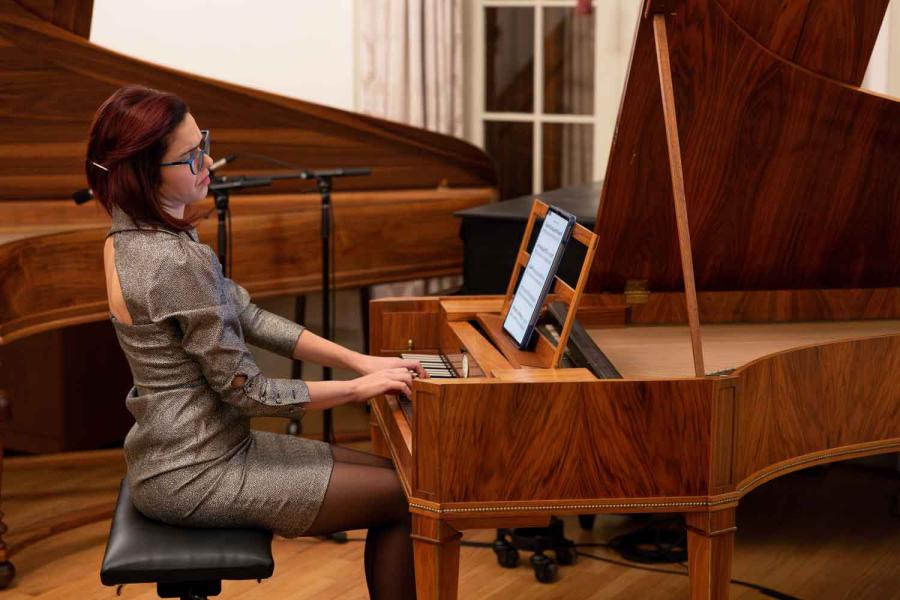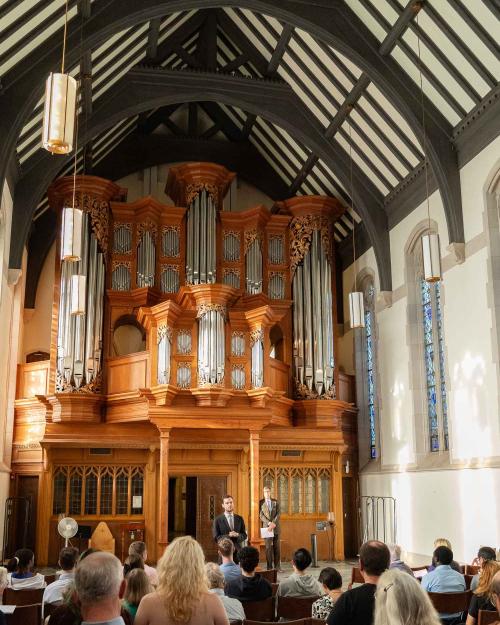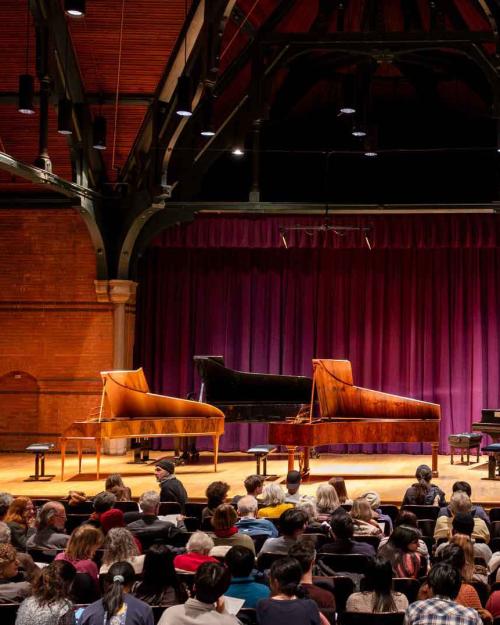A $5 million gift from the Abraham J. & Phyllis Katz Foundation to the Cornell Center for Historical Keyboards (CCHK) will secure the future of its museum-quality holdings, as well as a rich program of concerts, festivals and educational offerings.
“The instruments, which include pianos and organs from the 18th century to the present, are the core,” said the center’s founding director, Annette Richards, the Given Foundation Professor in the Humanities in the College of Arts and Sciences (A&S) and university organist.
“But we are also committed to bringing performance and scholarship together and creating opportunities for students to learn about the connections between music, technology, art and history,” Richards said. “The Katz gift will make all this a reality.”
Alexander Katz and his wife, Ellen Doft ’71, and their son, David Katz-Doft ’05, trustees of the Katz Foundation, wanted to create a safe and permanent home for Cornell’s collection of historical keyboards.

“These instruments require a controlled environment and constant maintenance, so that future generations of pianists will have the opportunity to experience what Mozart heard and responded to in the creative process at the keyboard,” Alexander Katz said.
“The reality is that this music was created and heard not on a Steinway D but on a more fragile and perhaps nuanced instrument,” Katz continued. “This center makes it possible for us to experience the music today as the composers did in their time.”
The CCHK has hosted a number of festivals and collaborative projects over the last few years, including “Beethoven and Pianos: Off the Beaten Path” in 2020, “Sustaining Keyboards” in 2023, Forte/Piano summer academies and “Improvisation at Work” in 2024.
Musicians from around the world have also visited the collection to use it for teaching – including artists associated with the International Fryderyk Chopin Piano Competition who offered master classes on Cornell’s instruments for their young competitors, Richards said.
The new gift also allows the center to hire a postdoctoral associate and artist-in-residence, Patricia Garcia-Gil, who is offering monthly performances, leading outreach efforts on campus and in the Ithaca community, and creating a series of video and audio recordings of the instruments to be added to the center’s website, in partnership with filmmaker Fabio Morelli.
She is also giving individual lessons and teaching chamber music on historical instruments, and developing educational programs within the Ithaca community and beyond.
“I feel very privileged to have access to a collection with so many different instruments,” Garcia-Gil said. “They are interesting historically, socially and culturally, as well as musically. I like to find ways of making them relevant to a wide audience through interdisciplinary connections. They are also works of art.”

Garcia-Gil has arranged many programs introducing the instruments to the public, including concerts and group visits to the center. “I encourage the audience to get close to the instruments,” she said. “I love seeing them getting surprised about the sounds and varied effects that each keyboard can make.”
This summer, Garcia-Gil and Roger Moseley, associate professor of music (A&S) and director of the CCHK, will present “Forte/Piano 2025: Crafting Soundscapes: A Festival Celebrating Pianos in History and History in Pianos,” a series of performances and events featuring internationally renowned scholars and performers.
Some of the center’s funding will be used for instrument maintenance, Richards said.
“Preserving the collection in concert-ready condition is a priority,” she said. “So too is educating musicians in the basic maintenance of their instruments and continuing to develop our ideas about curation, material culture and sustainability.”
The CCHK grew out of Cornell’s association with the Westfield Center for Historical Keyboard Studies, which Richards directed at Cornell from 2007-2017. When the Katz Foundation made a gift that allowed for the 2018 renovation of a space at 726 University Avenue, the center began to accept donations of important historical instruments, starting with those belonging to fortepianist Malcolm Bilson, the Frederick J. Whiton Professor Emeritus of Music (A&S).
“We have pianos that are representative of practically every school of piano-making, every nationality, every important moment in the history of the piano,” Richards said. “Nowhere else in the U.S. is there such a comprehensive collection of this quality.”
Combined with Cornell’s historical organs and other instruments, such as clavichords and Moog synthesizers, “you have an unmatched picture of keyboard culture that you can experience in a hands-on way,” Richards said.
“We’re very quick to throw away the past,” Katz said. “So we are doing a little bit of preservation in a world that is in dire need of it.”
Combined with Cornell’s historic organs and other instruments such as clavichords and Moog synthesizers, “you have an unmatched picture of keyboard culture that you can experience in a hands-on way,” Richards said.
“Historical keyboards are not just about history but about the present and future,” she said. “This inspiring gift will foster our central mission: to change people’s lives through music.”




